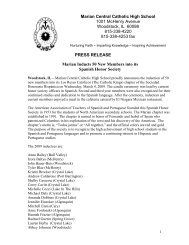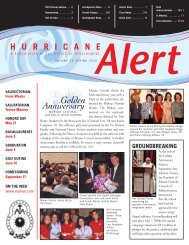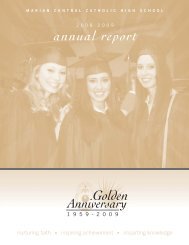WHAP - Marian Central Catholic High School
WHAP - Marian Central Catholic High School
WHAP - Marian Central Catholic High School
Create successful ePaper yourself
Turn your PDF publications into a flip-book with our unique Google optimized e-Paper software.
What is World History?<br />
Read the following quotes about world history and then answer the questions.<br />
William McNeill, Professor Emeritus of History at the University of Chicago<br />
“We don’t study the history of each separate state to understand American history. Nor do we study<br />
the state histories of California, Texas and Alaska and presume that their population and/or<br />
geographic advantage gives us the complete picture. Rather we study national experiences and<br />
developments to understand the history of the US. Similarly, in world history, we do not study the<br />
national histories of the biggest countries or the developments of the largest civilizations. Rather, we<br />
explore the global processes and connections that have shaped the world through time.”<br />
Heidi Roupp, President of the World History Association<br />
“World history is developing as a macrohistory - a history of the human experience [where]<br />
encounters with strangers are the main drive wheel of social change.”<br />
Dr. David Smith, Professor, Cal Poly Tech, Pomona, CA<br />
“World history is more general than traditional history and emphasizes trends that transcend cultural<br />
boundaries. World history stresses the treatment of inter-action between societies. In eras where<br />
such inter-action is limited, it compares different patterns of development around the world. Hence<br />
a world history study may involve cultures that actually had contact and influence on one another or<br />
cultures that went through various stages of development with little or no outside influence. World<br />
history tends to be more superficial and general than local or national histories. This is not meant in a<br />
negative way, but in the sense of a comprehensive view of history. The old cliche of not seeing the<br />
forest for the trees applies here. World history looks at the forest for the overall, global meaning of<br />
history. ”<br />
Marilynn Hitchens, Professor, Univ. of Colorado at Denver<br />
“A world history course should strive not to become a course in great civilizations, a study of various<br />
regions of the world, or a global issues course. What it should be is the study of human change and<br />
continuity over time.”<br />
Geoffrey Barraclough, British Historian and former Chichele Professor of Modern History, University<br />
of Oxford<br />
“World history in its contemporary connotation is not a synthesis of known fact or a juxtaposition of<br />
the histories of different continents or cultures, arranged in some sort of order of relative<br />
importance; rather it is a search for the links and connections across political and cultural frontiers. It<br />
is concerned not so much with development in time or with the goal and meaning of history--<br />
western preoccupations which non-western cultures for the mot part do not share-- as with the<br />
perennial problems which have assailed mankind everywhere and with the different responses to<br />
them. It [world history] has turned them [world historians] away from linear development, from the<br />
thread allegedly running through history from its earliest beginnings to the present day, to the<br />
comparative study of the institutions, habits, ideas and assumptions of men in all times and places.”<br />
5
















